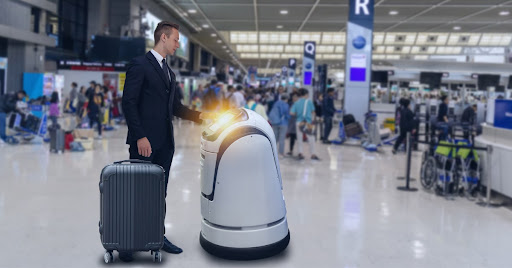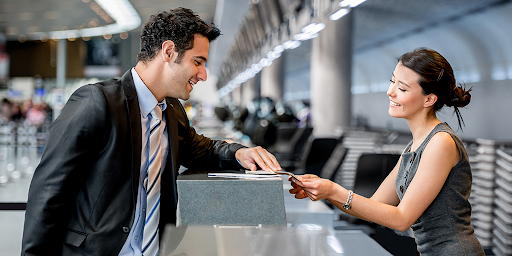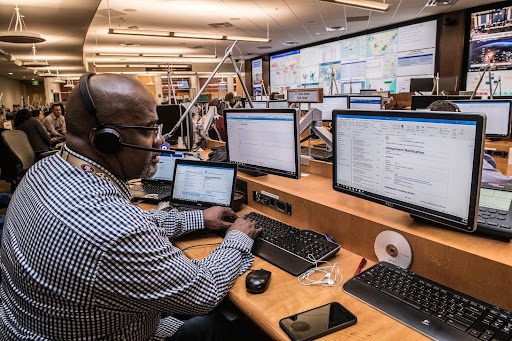IT Solutions for the Travel Industry You May Not Have Heard of

The travel industry, like most industries, becomes more sophisticated and competitive every year. Travel agents must go far beyond booking airline flights, rental cars, and hotel reservations over the phone or by email.
The new technologies available to the travel industry offer travelers dazzling possibilities. Here are some innovations we’ll discuss in this article:

2. Robots handling luggage and other mundane tasks
3. Contactless payments
4. Virtual and augmented reality (VR/AR)
5. AI-based chatbots, big data management, and other applications
6. Cybersecurity enhancements
7. Electronic recognition, ID scanners, and other tools critical to travel services.
Making intelligent use of these IT solutions for the travel
industry can keep you at the top of your travel customers’ minds. Ignoring them can quickly make you a “dinosaur.”
Voice-Activated Search and Control Functions
Contemporary smartphones and most computers include the option to use voice commands to conduct searches and control many other functions. User-friendly websites can’t afford to ignore this trend; many customers visiting a site without voice command will soon move on to a more convenient one.
The travel industry isn’t an exception to this rule either. In fact, it’s safe to say that voice commands are just as important to many IT solutions for the travel industry too.
Robots Can Do More Complicated Tasks Than Ever
Thanks to the advancements in AI technology, robots have evolved to levels where they can effortlessly handle more mundane tasks that were previously designated for humans. To prove their versatility, here are some IT solutions for the travel industry that robots can handle:
Greeting and information services in hotels (occasionally this can include luggage-handling and cleaning services too)
- Luggage cases or carts that automatically follow you
- Minor, less complicated food preparation duties in restaurants
- Screening for concealed weapons at airports.
How about a robot that guides you to the appropriate desk at airports?
As you can see, robots have reduced the need for extensive face-to-face human contact in many situations. This has been a great benefit during the first waves of the COVID pandemic and will undoubtedly have lasting effects even after the coronavirus is long gone.
As you can see, robots have reduced the need for extensive face-to-face human contact in many situations. This has been a great benefit during the first waves of the COVID pandemic and will undoubtedly have lasting effects even after the coronavirus is long gone.
Contactless Payments
Many merchants and their employees have become uncomfortable handling cash. And why they shouldn’t? A piece of paper currency has been through many hands. Who knows what pathogens it’s picked up along the way?
In this COVID-sensitive age, people are reluctant to handle things others have touched. Even plastic cards, though cleaner than paper cash, can carry germs. And for many years, credit/debit cards had to be handed over to cashiers to complete the payment – something that has become a strict no-no for many in light of COVID.
Thankfully, almost all recently issued credit and debit cards have embedded chips that allow payments to be completed without physical contact. Up-to-date card readers are basically ID scanners that can read these chips to complete a payment, even if the card is just close to the machine and isn’t physically making contact with it.
This is why proximity readers are among the simplest and most valuable IT solutions for the travel industry.
Virtual and Augmented Reality
Virtual and augmented reality are some of the most customer experience-enriching IT solutions for the travel industry.
With virtual reality (VR), travelers or would-be travelers can experience potential destinations as if they were actually there. However, as futuristic as this sounds, the technology has already been in use for many years. Real estate agents, for instance, have been offering virtual home tours, while Swedish furniture retail company IKEA has been offering its online room planners for many years. Now, travel agents can offer a virtual tour of a city or resort area travelers wish to visit.
Though they sound much alike, augmented reality (AR) is a bit different from virtual reality. It allows something already in someone’s view to be enhanced with supplementary information, such as contact information, additional services, seeing the scene in a different season, and many more. Suppose someone is looking at a city from a high vantage point. In that case, AR can highlight the exact location of a particular feature or point of interest and provide information about it.
AI Chatbots, Big Data Management, and Other Applications
AI Chatbots
Chatbots can easily provide standard answers to standard questions, and they can do it 24/7, regardless of staff availability. With AI (artificial intelligence) improving their capabilities, chatbots can also learn to answer more specific questions. And seeing the rapid development chatbots are going through, it’s quite likely that they’ll be able to answer any account-specific questions and handle more detail in the future.
What this means for the travel industry? For instance, bookings can be done without the involvement of travel agents, allowing them to focus more on complex cases and monitoring the chatbots’ activities to interfere when it’s necessary.
Big Data Management
It takes lots of data to manage a traveler’s history, preferences, family, and other details. An agency needs these details to be specific about handling an account and offering opportunities in line with travelers’ wants and needs.
Keeping track of where they’ve been, their airline seat and meal desires, hotel and rental car preferences, along with other details is data intensive. Just knowing what they need to know about the thousands of places people may want to go to is a major task. Of course, there’s information on the internet, but a full-service company must know more than its competitors if they want to offer a premium experience.
Careful deployment of IT solutions for the travel industry ensures that they can provide the accuracy and speed customers expect. However, it’s worth adding that hotels, airlines, cruise companies, and others all have specific data needs that can require massive databases. Thankfully, high-quality ID scanners can collect data quickly and accurately and can be connected to any database to store and retrieve data efficiently.
Cybersecurity Enhancements
As shown above, travel professionals use large databases and numerous websites to manage their businesses. They also have access to many customers’ personal information, credit card numbers, etc. This makes their systems fertile hunting grounds for cyber-crooks.
Cybersecurity measures must become increasingly sophisticated to defend against these efforts. Keeping up with country- or region-specific regulations, along with data privacy rules, can be a significant task in itself. However, cybersecurity is an IT enhancement for the travel industry that no one can afford to overlook. In fact, travel agencies need to have experts on hand and readily available to protect against cybercrime at all times.
Electronic Recognition: ID Scanners and Other Tools Are Key
With airliners, ships, and other conveyances handling hundreds or even thousands of travelers, electronic identification is increasingly important to keep queues moving and verify that the right people are indeed boarding. And while there are many initiatives at standardization, travelers can still show up at security checks with many documents, whether passports, visas, vaccination certificates, boarding passes, etc.
Reading these documents quickly and accurately is very important for efficiency and security. Adaptive Recognition offers some of the most advanced security-conscious ID scanners for enhancing cybersecurity. Using the advantages provided by electronic identification, long security and immigration lines in terminals can be significantly reduced. And if biometric (facial and fingerprint) recognition is also involved, going through security checks could end up being nothing more than a breeze.
We could go on and on about the benefits of AI and other enhancements for travel agencies. Due to space limitations, we’ll offer this resource for more information and tips about travel and IT solutions for the travel industry.
Like most businesses in today’s world, travel professionals can improve the service they offer their customers by using IT solutions for the travel industry.
Among the most important tools to expedite travels are electronic ID scanners and other document readers. Adaptive Recognition offers many high-quality options in this line.

 Greeting and information services in hotels (occasionally this can include luggage-handling and cleaning services too)
Greeting and information services in hotels (occasionally this can include luggage-handling and cleaning services too)





